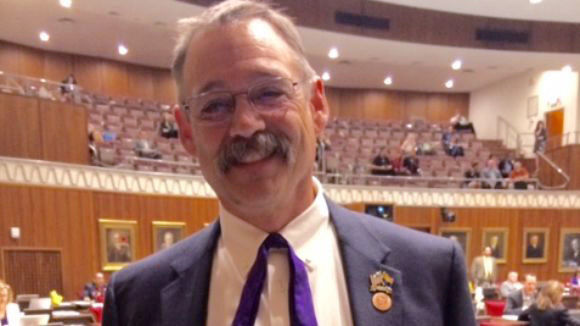You couldn’t find two much more different legislators than Republican Rep. Mark Finchem of Oro Valley and Democrat Rep. Daniel Hernandez of Tucson, but they were pulling the same way, in favor of the bill to extend the life of the Rio Nuevo district.
GOP Pima County Supervisor Ally Miller and Democratic Rep. Pamela Powers Hannley are pretty much opposite on the issues, but they were together on this one — opposed to the extension.
The bill to extend the funding flow for the district redeveloping downtown Tucson made for some strange bedfellows. But the extension won surprisingly handily in a Legislature not normally very inclined to help out the city of Tucson. The extension of the district’s end-date, from 2025 to 2035, means a portion of state sales tax money collected within the district boundary will keep flowing for another 17 years.
After talking to Finchem, the chief sponsor of the bill, I think I know one of the main reasons why it worked. He views the Rio Nuevo story as one of the state Legislature and a board of businessmen appointed by Republican leaders saving the socialist city of Tucson from itself.
Finchem moved to Southern Arizona from Michigan in 1999 and didn’t like what he saw in Tucson. He even heard of it referred to as “the Detroit of the Desert.” His opinion of Tucson, six or seven years ago, was “That city is going down the exact same path that Detroit went down.”
“We don’t have the capacity in this state to pay for a city that puts itself into bankruptcy,” he said.
Then, he said, in the years after the state took over Rio Nuevo in 2009, the redevelopment project eventually took off and started succeeding. When he visited last year, invited by members of Rio Nuevo, Finchem was impressed. And he came back. Eventually the arch-conservative became a believer in this tax-increment-financing district overseen by the state.
“When you see construction cranes, that means growth is going on in that city center,” Finchem said. “You look down Congress Street on any given evening, that thing is packed.”
The members of the Rio Nuevo board, led by Chair Fletcher McCusker, carefully cultivated support among Republican legislators. They brought them down and gave them tours up to four hours long.
“We provided each of them a project-by-project economic analysis,” McCusker said. “For people who have never been downtown or haven’t been there in a while, it’s really unbelievable.”
Not all Republicans were wowed. Supervisor Miller made it her mission to torpedo the plan, putting her at odds with Finchem, who has previously been a staunch ally. She accused McCusker and others of painting an unrealistically rosy picture of the district’s performance.
The proposal also got a little bit of surprising pushback from the left. Rep. Powers Hannley and other Democratic progressives voted against the bill. She objected to how far the project has strayed from the promises that Tucson voters originally embraced in 1999. She also questions its reliance on sales tax, a declining source of revenue.
But McCusker had the help of a particularly qualified lobbyist in rounding up the support. Jonathan Paton, of course, is not just a Republican former legislator from Tucson but also was a member of the Rio Nuevo board after the state took it over.
In the end, the bill passed the House by 38 to 17 votes, and the Senate by 21 to 9. In both chambers, the “no” votes came from a mixture of Democrats and Republicans. But the same was true of the “yes” votes.
“We were surprised with the bipartisan support,” McCusker said. “You can credit Rep. Finchem for that because he’s a very unlikely sponsor of this bill.”
Backpage issue is back
For months, the Arizona GOP has been chastising Democratic candidates who accepted money from Michael Lacey or James Larkin, the co-founders of the website Backpage.com. Backpage has been accused of facilitating the sex-trafficking of children through its ads.
A new indictment against Lacey, Larkin and others adds power to those accusations, although they are not accused of sex trafficking. Instead, the indictment accuses them of deliberately facilitating prostitution and money laundering.
“Virtually every dollar flowing into Backpage’s coffers represents the proceeds of illegal activity,” the federal indictment says.
Tiffany Shedd, a candidate for the GOP nomination in Congressional District 1, said incumbent Tom O’Halleran “knowingly accepted over $8k from individuals affiliated w/ child sex trafficking. Rural AZ deserves a Congressman who represents their values, not one that associates himself with those ripping away the innocence of children.”
Expect more of this criticism for any candidate who has received donations from Larkin or Lacey.
Kirkpatrick missing debate
You won’t be seeing apparent front-runner Ann Kirkpatrick at the next forum for Democratic candidates for Congress in Congressional District 2. A group called Represent Me AZ set up the event and understood Kirkpatrick to be available May 3, but she is not. No alternative dates in May were possible, so Represent Me is going ahead with the event without her.
“We asked all the other candidates if they would like to reschedule and they unanimously decided to attend this forum as scheduled,” organizer Marion Chubon said via Facebook. She went on, “The candidates agreed to also participate when Ann’s schedule allows in June.”
So now the plan is for there to be a forum featuring the five candidates at 6:30 p.m. on May 3 at Catalina High School, 3645 E. Pima Street, and another one in June, including Kirkpatrick.
TPD officer for Sinema
The new ad for Democratic U.S. Senate candidate Kyrsten Sinema features her “big bad Marine brother.” The 30-second spot refers to him as a police officer, but what it doesn’t make quite explicit is that he is a Tucson police officer, Paul Sheldon.
Rep. Sinema was born in Tucson but made her political career in the Phoenix area, rising from the state Legislature to Congress. The ad features Sheldon saying “Clearly she’s real headstrong,” and Sinema responding “I call it being independent.”







